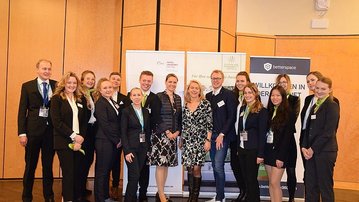
International Hotel Management students organise panel discussion at ITB Berlin
International Hotel Management students organise panel discussion at ITB Berlin

As in previous years, a panel discussion was held by the students of SRH Dresden and GreenLine Hotels, led by Suzann Heinemann, at the ITB in Berlin.
After intensive preparation, the discussion on the topic ALEXA, SIRI & CO - MY NEW COLLEAGUE OR FOLLOWER? WELCOME TO THE DIGITAL WORLD on the opening day of this year's ITB last Wednesday at the Großer Stern in the packed Hong Kong Room was met with broad interest.
Around 37% of adults in Germany already use a voice assistant in their own homes. Google has already introduced a hotel booking function for the voice-controlled Google Assistant and Marriott is equipping all hotels in the USA with Alexa.
In the future, hotel operators will be able to make their guests' stay much more convenient. Instead of calling the reception desk, they can use the voice assistant to control lighting, music, heating, and the TV by voice, get tips for the surrounding area, order room service, book spa appointments or make a table reservation in the hotel restaurant.
How must the hotel industry in our country prepare for the digital future and what role do voice assistants play as a service and work facilitator? What hurdles do we still have to face? The moderators Merle Michligk and Simon Kamps got to the bottom of these questions together with the panel guests.
"We are still at the beginning."
Björn Vöhl, Director Market Management Germany, Austria and Switzerland at Expedia Group, is of the opinion that voice and chatbots have long since ceased to be futuristic technologies and have long since developed - also in travel planning - as valuable and almost self-evident everyday tools. In the hotel industry, he emphasised, we have to be at the forefront from the very beginning and adjust ourselves to the interests and needs of travellers when it comes to developing voice-controlled technologies. However, Mr Vöhl emphasised, we are still at the beginning as the technology still has to be tested, and in this context, Alexa and the Google Assistant in particular have emerged as the most suitable tools at Expedia.
"Ideal technology for young and old."
Florian Bauhuber, founder and CEO of Tourismuszukunft, left no doubt that voice assistants will change all areas of human activity and of course also tourism practices. For the hotel industry, the question for him is how data, offers & services can most sensibly become part of voice services. According to Bauhuber, there is no one right way. For him, the core question remains: “Which customer problem do I want to solve with voice assistants?"
He also emphasised that this future model for the hotel industry is still in the learning phase, but soon it will be unimaginable without it and that there will be a very quick habituation effect on the part of the guests. When asked whether it could destroy jobs, he, like the other participants, could not give a concrete answer. "It certainly depends on the hotel concept and to what extent the respective business will use the voice assistant to make work easier. There will also still be guests who value personal service."
However, he is convinced that it appeals to both young and older generations because it is the first digital technology that does not require prior knowledge and can therefore be used by everyone. This gives you the chance to bring the older population groups onto the internet, who would also have fewer concerns about data protection.
"Filter guest needs and protect privacy".
Maarten van Dongen, Manager Projects & Finance at Amedia Hotels, explained that the first hotel of his chain will already open in Austria in November with the software and that there will be two test hotels to begin with. First of all, it is important to gather meaningful information in order to then filter out the guests' wishes. For him, interactivity between hotel and guest is the future and voice control is part of it. However, he points out that privacy is an important commodity. In his opinion, the winners will be those who find the right balance and manners.
"Hoteliers must develop an open attitude towards digitalisation".
Dirk Klein, Chief Digital Officer at HAFFUS GmbH, highlighted that the current possibilities of voice assistants have developed exponentially. He plans to launch an "Alexa" version integrated into the guest tablets this year. The necessary digital interfaces to booking systems and the hotel programme are already in place. His next step is to test guest acceptance for inspiration, booking and on-site service. His challenge will be to introduce his guests to the new technology, inspire trust and ensure data protection. He believes in a positive financial aspect because the initial costs are offset by the time saved by the staff, the higher service performance and the system simplification. Overall, a positive economic result can be expected.
"The risk remains with the hotelier, the winners are mainly Amazon & Co."
Peter Hense, lawyer and partner at Spirit Legal LLP, urges caution. He is clearly of the opinion that voice assistants are convenient to use and useful and will therefore become established. It should be noted, however, that hoteliers are then also responsible for the use of the technology and must vouch for compliance with data protection, IT security and smooth functionality. In his opinion, this additional obligation should be taken into account. "Does every hotelier know the legal regulations? What data-legal information must be handed over to the guest at check-in? These are all details that Amazon and Google themselves do not even inform about. What happens to all the data processing that hoteliers and guests have no control over?"
Hense is convinced that the guests will accept this technology, despite the fact that it is not legally secure, and that it will establish itself regardless of this. However, the hotelier helps the voice assistant to increase its own reach, to collect data and to use it for its own purposes, without benefiting from it himself, because he learns nothing from the voice entries. Ultimately, it remains to be seen whether Germany will follow the American market and make it easy to use digital voice assistants in terms of data protection.
"Alexa, lights off..."
More about the "International Hotel Management" degree programme